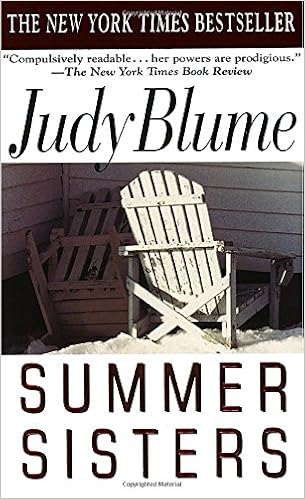 If you went to camp as a kid, did you wonder what the counselors did in the evenings? Speaking for myself, that’s when I learned to play Name it and Claim It. Are you familiar with the game? One person sings a few lines from a song, and if you can either join in singing or identify who made the song famous, you win. Sort of. See, knowing the song was usually a sign of how old you were and, although most of the staff were all still in college, advanced age wasn’t an honor we were all that anxious to grab. I haven’t played the game in years. Yet, Name It and Claim It was the first thing that came to mind as I read Judy Blume’s Summer Sisters: A Novel. In so many ways, it’s a Gen-Xer’s version of We Didn’t Start the Fire.
If you went to camp as a kid, did you wonder what the counselors did in the evenings? Speaking for myself, that’s when I learned to play Name it and Claim It. Are you familiar with the game? One person sings a few lines from a song, and if you can either join in singing or identify who made the song famous, you win. Sort of. See, knowing the song was usually a sign of how old you were and, although most of the staff were all still in college, advanced age wasn’t an honor we were all that anxious to grab. I haven’t played the game in years. Yet, Name It and Claim It was the first thing that came to mind as I read Judy Blume’s Summer Sisters: A Novel. In so many ways, it’s a Gen-Xer’s version of We Didn’t Start the Fire.In a way, this is entirely appropriate, since Judy Blume was the writer for many Gen-X women at an early point in their lives. Her Middle Grade and Young Adult stories steered many of them through the horrible, hormonal adolescent years until they grounded safely into adulthood. That’s no small task, and many grown women remember Blume because of the help she gave them as girls. And memory is the central theme of Summer Sisters.
These are Victoria “Vix” Leonard’s memories of her friendship with Caitlin Somers. At first meeting, these two girls should have little in common. Victoria, growing up in a working-class family, is familiar with siblings and debt. Caitlin, the only child of affluent, divorced parents, knows the joys and sorrows of travel and non-stop relocation. What they share is a sense of loneliness that is relieved when they become friends. The effects of that relationship change the trajectory of both their lives.
Blume tracks the changes of her characters’ young lives through the popular songs and news stories they follow, a move that first endears and then dates her story. When Vix says in the first chapter that she dreams of being the bewitching “Dancing Queen” when she sings along with the record, it tells us a lot, both about the story’s setting and what occupies this child’s imagination. Unfortunately, nearly every chapter follows with some pop culture marker until the reference feels obligatory. By the time Vix mentions the padded shoulders in her first business suit, I wanted to shout, “Yes, I get it! We’re in the 80’s!”
Blume does a better job of capturing Martha’s Vinyard, that off-beat, island of eccentrics, hard-working islanders, summer tourists, and money. A Summer day at the Vinyard is something to be experienced, with its ambiance of light, color, and joy and you get the suggestion of that in this fire-fly narrative, as well as how much harder life is for year-round residents. But, what she does nail is the intensity and durability of certain adolescent friendships. Adult friends like the people we became; first friends loved the people we were becoming. That makes them worth remembering and writing about, for the rest of our lives.


No Comments
Comments are closed.